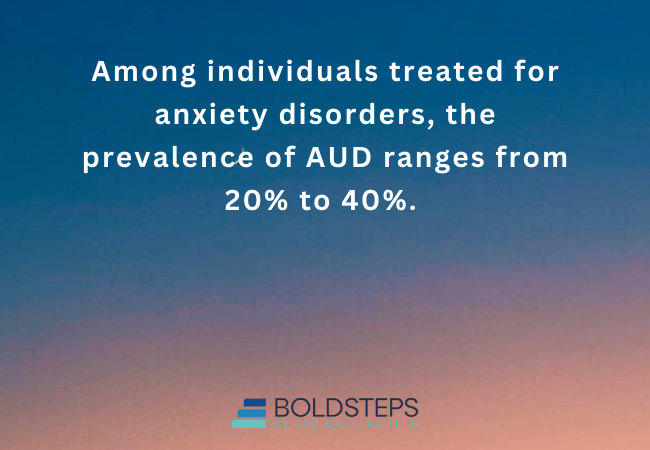Alcohol and mental health are deeply connected. Many individuals struggling with depression, anxiety, PTSD, or other mental health conditions turn to alcohol as a coping mechanism. While alcohol may offer temporary relief, it ultimately worsens mental health symptoms, increases the risk of addiction, and fuels a dangerous cycle of dependency.
This combination—when someone experiences both a mental health disorder and substance use disorder (SUD)—is known as a dual diagnosis or co-occurring disorder. Addressing only one condition without treating the other often leads to relapse and worsening mental health. That’s why Dual Diagnosis Treatment, which integrates addiction recovery with mental health care, is the most effective approach for lasting recovery.
At Bold Steps Behavioral Health in New Hampshire, we provide specialized, evidence-based Dual Diagnosis Treatment designed to help individuals regain mental stability, overcome alcohol dependence, and build a sustainable, sober life.
This article explores:
- The link between alcohol use and mental health conditions
- How alcohol affects depression, anxiety, PTSD, and more
- The dangers of self-medication
- Why treating both conditions together is essential
- How Dual Diagnosis Treatment works and available programs in New Hampshire
How Alcohol Affects Mental Health
Alcohol is a depressant that interferes with neurotransmitter function in the brain, which is responsible for mood, cognition, and behavior. While drinking may provide temporary relief from stress or sadness, prolonged use leads to:
- Increased depression and suicidal thoughts
- Heightened anxiety and panic attacks
- Greater emotional instability and mood swings
- More severe PTSD symptoms and emotional numbness
Alcohol can worsen pre-existing mental health disorders, making treatment more difficult and increasing the risk of addiction.
The Link Between Alcohol and Specific Mental Health Disorders
1. Alcohol and Depression: A Vicious Cycle
Many people drink alcohol to escape feelings of sadness or loneliness, but alcohol actually:
- Reduces serotonin and dopamine levels, leading to worsening depression over time.
- Disrupts sleep cycles, increasing fatigue and depressive symptoms.
- Lowers inhibitions, increasing suicidal thoughts and self-destructive behavior.
Statistics:
- Over 63% of people with Alcohol Use Disorder (AUD) also have depression. (National Institute on Alcohol Abuse and Alcoholism, NIAAA)
- Alcohol increases suicide risk, with 1 in 3 suicide attempts involving alcohol intoxication.
2. Alcohol and Anxiety: Temporary Relief, Long-Term Consequences
Alcohol initially reduces feelings of stress, but long-term use actually increases anxiety.
- Alcohol suppresses the body’s natural stress response, making individuals dependent on drinking to relax.
- Alcohol withdrawal triggers severe anxiety and panic attacks, making quitting difficult.
- Over time, alcohol causes emotional instability, social anxiety, and difficulty managing stress.
Statistics:
- 20% of people with an anxiety disorder also have an Alcohol Use Disorder. (National Institute on Drug Abuse, NIDA)
- Alcohol withdrawal symptoms often mimic anxiety disorders, making diagnosis and treatment challenging.
3. Alcohol and PTSD: Heightened Trauma Responses
People with Post-Traumatic Stress Disorder (PTSD) often use alcohol to numb painful memories, flashbacks, and anxiety, but:
- Alcohol reduces the brain’s ability to process trauma, worsening symptoms.
- Alcohol prevents proper healing, making PTSD treatment less effective.
- Drinking increases the risk of aggression, reckless behavior, and emotional outbursts.
Statistics:
- 52% of men and 28% of women with PTSD develop alcohol dependence. (U.S. Department of Veterans Affairs)
- Veterans with PTSD are more likely to engage in binge drinking and self-harm.
4. Alcohol and Bipolar Disorder: Increased Mood Swings
For individuals with bipolar disorder, alcohol can intensify mood swings, causing:
- More frequent manic and depressive episodes.
- Increased impulsivity and reckless behavior during mania.
- Heightened suicidal risk during depressive episodes.
Statistics:
- Alcohol use disorder is three times more common in individuals with bipolar disorder. (American Journal of Psychiatry)
The Dangers of Self-Medicating with Alcohol
Many individuals drink alcohol to “self-medicate” mental health symptoms, but this often leads to:
- Increased alcohol tolerance → needing more alcohol to achieve the same effect.
- Alcohol dependence → experiencing withdrawal symptoms when not drinking.
- Greater mental health deterioration → worsening depression, anxiety, or PTSD.
- Risk of dual diagnosis → developing both an addiction and a mental health disorder.
Key Takeaway: Self-medicating with alcohol doesn’t treat the underlying problem—it makes it worse. Professional Dual Diagnosis Treatment is the best solution.
What is Dual Diagnosis Treatment?
Dual Diagnosis Treatment is a specialized integrated treatment approach that simultaneously addresses:
- Alcohol addiction (substance use disorder)
- Mental health disorders (depression, anxiety, PTSD, bipolar disorder, etc.)
Unlike traditional rehab, which only focuses on addiction, Dual Diagnosis Treatment ensures both mental health and substance abuse are treated together to prevent relapse.
How Dual Diagnosis Treatment Works at Bold Steps Behavioral Health
1. Medical Detox for Alcohol Withdrawal
- Safely removes alcohol from the body while managing withdrawal symptoms.
- Reduces risk of seizures, delirium tremens (DTs), and severe anxiety.
2. Partial Hospitalization Program (PHP)
- Full-day structured treatment (5-6 hours per day).
- Therapy, medical care, and emotional support for both addiction and mental health.
- Helps individuals stabilize and develop healthy coping mechanisms.
3. Intensive Outpatient Program (IOP)
- Flexible scheduling to balance work, family, and treatment.
- Focuses on relapse prevention, emotional regulation, and stress management.
4. Outpatient Treatment & Virtual Therapy
- Provides long-term mental health and addiction support.
- Access to therapy remotely for those needing more flexibility.
Therapies Used in Dual Diagnosis Treatment
Cognitive Behavioral Therapy (CBT)
- Helps individuals recognize and change negative thought patterns.
- Teaches healthy coping skills to replace alcohol use.
Dialectical Behavior Therapy (DBT)
- Focuses on emotional regulation and distress tolerance.
- Effective for individuals with PTSD, bipolar disorder, and alcohol addiction.
Trauma-Informed Therapy
- Addresses past trauma without resorting to alcohol.
- Helps individuals process emotions and build resilience.
Medication-Assisted Treatment (MAT)
- Uses FDA-approved medications to reduce alcohol cravings and stabilize mood.
- Often combined with therapy for long-term recovery.
Take the First Step Toward Healing
If you or a loved one is struggling with alcohol addiction and mental health challenges, help is available. At Bold Steps Behavioral Health in New Hampshire, we offer specialized Dual Diagnosis Treatment designed to help individuals overcome alcohol addiction while stabilizing their mental health. Call (603) 915-4223 to learn more about our Alcohol Addiction and Mental Health Treatment Programs in New Hampshire. Your recovery starts today—take the bold step toward a healthier future.
FAQ on Alcohol and Mental Health
What is Dual Diagnosis Treatment?
Dual Diagnosis Treatment is an integrated approach that addresses both mental health disorders (e.g., depression, anxiety, PTSD) and substance use disorders (alcohol addiction, drug dependence, etc.) at the same time. It focuses on treating both conditions together to prevent relapse and promote long-term recovery.
How does alcohol affect mental health?
Alcohol disrupts brain chemistry, leading to:
- Increased depression and suicidal thoughts
- Heightened anxiety and panic attacks
- Worsened PTSD symptoms and emotional dysregulation
- Increased mood swings in bipolar disorder
Why do people with mental health disorders often develop alcohol addiction?
Many individuals use alcohol to self-medicate symptoms of anxiety, depression, PTSD, or other disorders. While alcohol provides temporary relief, long-term use worsens these conditions, leading to dependency and addiction.
What mental health disorders commonly co-occur with alcohol addiction?
Some of the most common co-occurring disorders include:
- Depression
- Generalized Anxiety Disorder (GAD)
- Post-Traumatic Stress Disorder (PTSD)
- Bipolar Disorder
- Borderline Personality Disorder (BPD)
- Schizophrenia or psychotic disorders
How do I know if I have a dual diagnosis?
You may have a dual diagnosis if you:
- Use alcohol to cope with emotional pain, stress, or past trauma
- Experience worsening depression, anxiety, or mood swings after drinking
- Feel unable to function without alcohol despite negative consequences
- Have tried quitting alcohol but relapsed due to mental health struggles
What happens if I only treat my alcohol addiction but not my mental health disorder?
If only alcohol addiction is treated, underlying mental health issues remain untreated, leading to:
- Increased cravings and relapse risk
- Ongoing depression or anxiety, making sobriety harder to maintain
- Worsened emotional instability and self-destructive behaviors
What treatment options are available for dual diagnosis at Bold Steps Behavioral Health?
We offer comprehensive treatment programs in New Hampshire, including:
- Medical Detox – Safe withdrawal management
- Partial Hospitalization Program (PHP) – Full-day structured therapy
- Intensive Outpatient Program (IOP) – Flexible therapy while maintaining daily responsibilities
- Outpatient Treatment & Virtual Therapy – Long-term support for recovery



